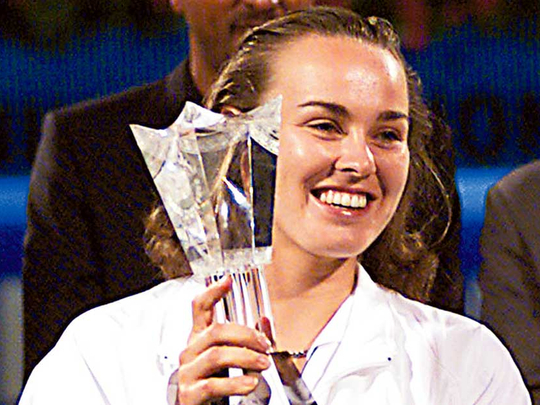
Omar Al Duri and Vladislav Frakas, two Dubai-based fitness trainers tell us the qualities that make a winner.
“The experience is an education pattern in itself. That teaches you things that books can’t teach you. The more we evolve and as time passes, the more we realise that they are many contributing factors to success,” says Al Duri, fitness trainer and nutritionist at Platform 3.
Frakas, a trainer and squash coach at Fitness First agrees. A little over a decade ago Frakas was a player in the Serbian national rugby and squash teams.
“As a professional player you build your own routine over the years. It’s an individualised routine which proves to be effective for you both as a person and as an athlete, whether you are a team member or single player; whether it’s during your training or play time or time off,” Frakas says.
Mindset
“If you succeed too early sometimes you may not really appreciate the value of the journey of getting there and if it takes too long you may get disheartened that it’s too far away”, says Al Duri. “So the mental aspect is a challenge, sometimes felt when failure is experienced. But it is impossible to succeed every time and I think if more the athlete or person facing the challenge realises that the more they appreciate the actual reward at the end. This reward can be different externally and internally. Someone might feel internally scarred or damaged, and feel they are not reaching their heights. But on the outside you see the smiles, the composure. I’ve worked with so many different people facing challenges and they’ve wanted to quit but they were resilient, relentless. And that’s what makes them winners. This mental toughness is equally as important as the physical toughness”.
Frakas says self motivation is an essential tool to success.
“As professional players, we are trained in techniques and routines to help us focus. During a break or before the match you need to talk yourself into performing your best. You need to tell yourself to believe in the hard work you’ve put in. Also, I’ve seen athletes turn to music and other disciplines to calm themselves. Some use soft, soothing music while others prefer loud, fast paced music, to either calm themselves or charge themselves. This helps them take their focus away from how good the opponent or the opposing team is and to focus on what they can give to the game”.
Nutrition
The sport nutrition side of it now is extremely important – what to eat, intolerances, how it affects performance, even blood types, says Al Duri.
“The more I was reading [on nutrition], the more I was getting confused with so many different opinions, and I thought I need to get a nutrition degree after my sports science degree. But even after that I thought where does one draw the line here? Do you tell someone stay away from gluten or dairy then what are they going to eat? In the old days they had none of these things and yet they were living healthier than we are now. Today there’s so many added preservatives, high fructose corn syrup and MSG that affect our food. I heard something a few years ago and it rang a bell in me: you can take in 10,000 calories a day and still starve yourself from nutrition. It depends on what you are eating rather than how much you are eating. At the same time you can’t forget every body type is different”.
Incorporating other disciplines
On top of the exercise and nutrition is sports’ psychology aspect, Al Duri says.
“People are now studying the biomechanics side of things. Sports science is now in clinics, schools, football clubs, everywhere, just to monitor things we don’t normally see. Corrective exercise is being highlighted to prevent you from getting injured and that consists of mobility, of being functional. Even athletes sometimes train the same way consistently, leaving no room to develop because their bodies get programmed a specific way. So mobility, flexibility, even the way the body functions is being highlighted even more. Disciplines such as yoga, pilates – even parkour – are so important to master to get to that peak level. Take for example athletes such as Rory McElroy, [Novak] Djokovic, Christiano Ronaldo. Yes, they have talent but they continuously evolve and look at other disciplines in order to succeed. It’s not luck, it’s 100 per cent effort. I was recently told Ronaldo spends four hours a day in the gym, which is ridiculous. But he’s spending ‘x’ amount of hours to perfect himself. And that is the level many aspire to be at because, whether the personality is great or not, it’s the commitment, the desire to just be the best. At the same time, in the same division you have someone who’s complete different. Leo Messi doesn’t look like a footballer but he’s one of the best. He’s a natural talent. Yes he must train but he doesn’t spend as long”.
The coach
While we some coaches angry and screaming instructions on the field, others are calm. But one can’t say either is better. What’s needed is balance, says Frakas.
“If it is one-on-one coaching then a connection is more easily established between the coach and trainee, than in team training. What’s essential for a good coach is to find the right balance. There will be times when you need to handle the player calmly and then times when he or the team needs to know who’s the boss. If you see Chelsea club manager [Jose] Mourinho, he is always on the lines shouting instructions to the players. And he’s extremely successful. On the other hand you have certain Italian coaches who always remain calm but have produced successful teams. It also depends on how the team accepts you”.













